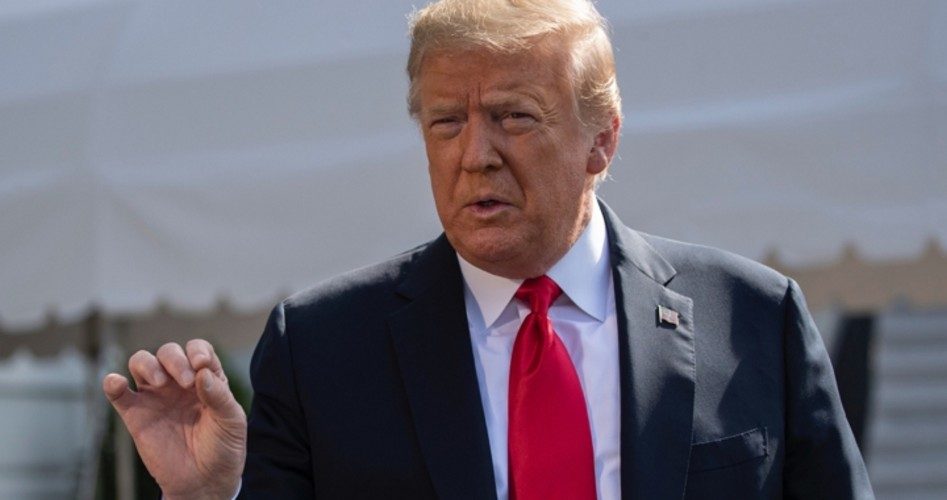
President Trump sent the high-tech industry into a conniption fit yesterday by closing the cheap labor spigot from abroad for the rest of 2020.
His latest proclamation suspends H-1B and H-2B visas that go to foreigners who enter the United States and take jobs from Americans, a particularly significant decision given that nearly 47 million Americans have filed for unemployment since the Chinese Virus pandemic began and public officials shut down the country in a panic.
The order will block the importation of more than half-a-million workers.
Immediately the bazillionaire tycoons of the tech industry threw a tantrum and cast the order as a war on “immigrants” and a threat to “diversity.”
In fact, it’s a threat to the bottom line because cheap foreign labor lowers wages.
The Order
The latest proclamation to protect American workers follows a 60-day moratorium announced on April 22.
It shuts the door to the H-1B and H-2B visas that Big Business has used for years to generate massive profits and line the pockets of boardroom plutocrats.
“The overall unemployment rate in the United States nearly quadrupled between February and May of 2020,” the proclamation says. “While the May rate of 13.3 percent reflects a marked decline from April, millions of Americans remain out of work.”
The week ending June 13, another 1.5 million Americans filed for unemployment benefits, which pushed the total since March 1 to about 46.5 million, more than 10 percent of the U.S. population.
“American workers compete against foreign nationals for jobs in every sector of our economy,” the proclamation continued, “including against millions of aliens who enter the United States to perform temporary work”:
For example, between February and April of 2020, more than 17 million United States jobs were lost in industries in which employers are seeking to fill worker positions tied to H-2B nonimmigrant visas. During this same period, more than 20 million United States workers lost their jobs in key industries where employers are currently requesting H-1B and L workers to fill positions. Also, the May unemployment rate for young Americans, who compete with certain J nonimmigrant visa applicants, has been particularly high — 29.9 percent for 16-19 year olds, and 23.2 percent for the 20-24 year old group. The entry of additional workers through the H-1B, H-2B, J, and L nonimmigrant visa programs, therefore, presents a significant threat to employment opportunities for Americans affected by the extraordinary economic disruptions caused by the COVID-19 outbreak.
Those numbers mean one thing: The influx of cheap labor had to stop.
“Excess labor supply is particularly harmful to workers at the margin between employment and unemployment — those who are typically ‘last in’ during an economic expansion and ‘first out’ during an economic contraction,” the proclamation continues. “In recent years, these workers have been disproportionately represented by historically disadvantaged groups, including African Americans and other minorities, those without a college degree, and Americans with disabilities”:
We must remain mindful of the impact of foreign workers on the United States labor market, particularly in the current extraordinary environment of high domestic unemployment and depressed demand for labor. Historically, when recovering from economic shocks that cause significant contractions in productivity, recoveries in employment lag behind improvements in economic activity.
And so until the end of the year, no more cheap-labor visas.
Aside from cutting H-1B and H-2B visas that permit the importation of endless chains of high-tech and agriculture workers, the order also blocks the entry of J visa workers such as au pairs and camp counselors, and L visas workers designated as internal management transfers.
The order will block about 525,000 job-gobbling foreigners.
Tech Titans Hate It
The titans of high tech who’ve pocketed billions as millions of Americans have filed for unemployment immediately cast the proclamation as an attack on “immigration.”
“Immigration has contributed immensely to America’s economic success, making it a global leader in tech, and also Google the company it is today,” tweeted Google CEO Sundar Pichai, an Indian immigrant who completed his education in the United States and never left. “Disappointed by today’s proclamation — we’ll continue to stand with immigrants and work to expand opportunity for all.”
YouTube CEO Susan Wojcicki agrees with Pichai:
Immigration is central to America’s story, and it’s central to my own family’s story. My family escaped danger and found a new home in America. @sundarpichai is right — at @YouTube, we join Google in standing with immigrants and working to expand opportunity for all.”
How slamming the U.S. labor market with more workers will “expand opportunity for all,” Wojcicki did not explain.
Tim Cook, the CEO of Apple, tweeted his displeasure, too: “Like Apple, this nation of immigrants has always found strength in our diversity, and hope in the enduring promise of the American Dream. There is no new prosperity without both. Deeply disappointed by this proclamation.”
The three tech tycoons are not, apparently, concerned about the “prosperity” of the unemployed.
Photo: AP Images
R. Cort Kirkwood is a long-time contributor to The New American and a former newspaper editor.



